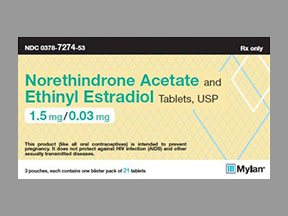Microgestin 1.5/30 is a limited distribution medication.

Microgestin 1.5/30 Coupons & Savings Card – Discount Prices from $13.40
Brand for: Norethindrone acet-ethinyl est
My prescription
Edit
1.5-30MG-MCG, Norethindrone Acet-ethinyl Est (21 Tablets)
Select pharmacy

CVS
$20.91
COUPON PRICE
Walmart
$13.40
COUPON PRICE
Walgreens
$13.53
COUPON PRICE
Albertsons
$14.06
COUPON PRICEMicrogestin 1.5/30 savings card
Show this card to your pharmacist
Walmart
$13.40
BIN
ID
PCN
GRP
019876
LH86FA6AE9
CHIPPO
LHX
Powered by
Microgestin 1.5/30 (Norethindrone Acet-ethinyl Est) dosage forms
Dosage Quantity Price from Per unit 1.5-30MG-MCG 21 Tablets $13.40 $0.64 1.5-30MG-MCG 63 Tablets $26.13 $0.41
| Dosage | Quantity | Price from | Per unit |
|---|---|---|---|
| 1.5-30MG-MCG | 21 Tablets | $13.40 | $0.64 |
| 1.5-30MG-MCG | 63 Tablets | $26.13 | $0.41 |
What is Microgestin 1.5 30 used for?
Microgestin 1.5/30 is a combination oral contraceptive pill used to prevent pregnancy. It contains two hormones, an estrogen and a progestin, which work together to inhibit ovulation, alter the uterine lining, and thicken cervical mucus to prevent sperm from reaching an egg.
Does microgestin 1.5/30 stop your period?
Microgestin 1.5/30 is a combination oral contraceptive that can affect menstrual cycles. While it is primarily used to prevent pregnancy, it may also lead to lighter periods or, in some cases, cause periods to stop altogether. However, individual responses can vary, and some may still experience regular periods. If there are concerns about changes in menstrual cycles while taking Microgestin 1.5/30, it is advisable to consult a healthcare provider.
Is Microgestin being discontinued?
As of the latest available information, there is no indication that Microgestin is being discontinued. It is always advisable to check with a healthcare provider or pharmacist for the most current information regarding medication availability.
Is microgestin a strong birth control?
Microgestin is considered an effective form of birth control when taken as directed. It contains a combination of estrogen and progestin, which work together to prevent ovulation, thicken cervical mucus, and alter the uterine lining to prevent pregnancy. Its effectiveness is comparable to other combination oral contraceptives. However, individual experiences with side effects and efficacy can vary, so it is important for individuals to consult with their healthcare provider to determine if it is the right option for them.
Does Microgestin 1.5-30 help with acne?
Microgestin 1.5/30, a combination oral contraceptive, may help improve acne in some individuals. This is because it can regulate hormones that contribute to acne development. However, the effectiveness can vary from person to person, and it is important to consult a healthcare provider to determine if this medication is suitable for addressing acne concerns.
